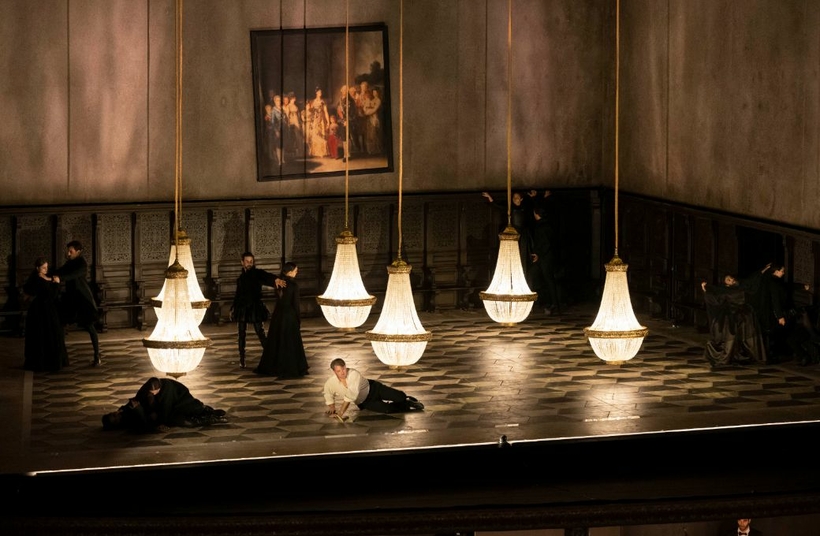On November 29, the Teatro San Carlo, Naples, opened the new season with a Big Bang. For the first time since 1872, the company presented Verdi’s epic Don Carlo not in the long-standard four-act abridgement set entirely in the claustrophobic Spain of Philip II. Instead, the company opted for a five-act edition, restoring the self-contained tragedy of an opening act set in the more romantic locale of France. The live stream of the premiere remains available for viewing on demand.
Many connoisseurs consider the San Carlo the most splendiferous and prestigious opera house in all Italy. Inaugurated in 1737, it’s also the oldest, predating the Regio in Turin by a mere three years but La Scala, in Milan, by over four decades—never mind the Fenice in Venice (1792), and those Giovannis Come Lately in Rome (1880) and Palermo (1897).
The stakes for any major company are high on opening night. Worst things first: the Slovak conductor Juraj Valčuha (newly established as music director of the Houston Symphony Orchestra) struggles to keep his musicians together; and his conception of Verdi’s music, where apparent, is coarse.
The American tenor Matthew Polenzani sings Don Carlo, the Spanish crown prince who loses his beloved French fiancée Elisabetta de Valois to his tyrannical father Philip II. Polenzani pleased many last season in the Met’s new five-act production in the increasingly favored original French (Naples goes with Italian). This time out, he smudges the lyricism of the polished courtier and falls short in the heroism of warrior manqué.

There’s better news about Don Carlo’s “mother,” as he must call Elisabetta after his father’s wedding. The soprano Ailyn Pérez, another American, inhabits the role with tragic dignity and delivers extended sequences—especially a touching farewell to a banished favorite—with lambent beauty. The Italian bass Michele Pertusi, out of sorts as Cherubini’s Creon in the Metropolitan Opera’s opening-night Medea, reverts to form as a cigarette-smoking King Philip.
As Carlo’s soulmate Rodrigo, coopted by Philip, the French baritone Ludovic Tézier pours on beefy sound in abundance. But for glamour, theater smarts, and fiery musicianship, the ace in the hole is the Latvian mezzo-soprano Elīna Garanča as the two-faced Princess Eboli, who sleeps with the king though she covets the prince.
Claus Guth’s shadow-haunted, largely anachronistic production unfolds in an appropriately austere unit set. There’s lots of invented stage business, not all of it entirely irrelevant. We hear the holy terror of Mother Church in the peremptory bass of Alexander Tsambalyuk’s Grand Inquisitor—but we catch sight of it, too, in four faceless spooks who orbit around him. Maudlin black-and-white video evokes Carlo and Rodrigo’s innocent boyhood crush.
Inspired by a Spanish court custom (Google “Velázquez, El Primo”), Guth introduces a grown, bearded mute the size of a small child; identified as “il Giullare” (the Jester), he scampers in variously as Cupid, a monk, various court ladies, and more. In the final bows, the house gives the mime Fabián Augusto Gómez a thunderous ovation. The guy’s a total star. Now, if he just could sing Rigoletto.
The Naples Don Carlo is available for streaming on Medici TV
Matthew Gurewitsch writes about opera and classical music for AIR MAIL. He lives in Hawaii

